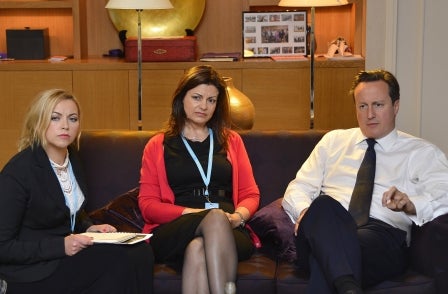
Prime Minister David Cameron will consider introducing a new independent regulator with the power to fine errant newspapers following the Leveson Inquiry, singer Charlotte Church said today.
The singer said she had been concerned by "murmurs" that Cameron would reject any demands by Lord Justice Leveson to create a powerful regulator following his inquiry in to Press standards.
Church, one of the celebrities leading the Hacked Off campaign, met Cameron at the Conservative party conference in Birmingham to seek assurances he would consider steep fines for editors found to have broken the industry's code of conduct.
Speaking at a press conference, Church, 26, said: "After meeting the Prime Minister I have faith that he will accept any recommendations from the Leveson report that would lead us to a genuine, independent regulator, that we the public can trust and is not controlled by the editors. I find that very comforting."
Asked how she would feel Mr Cameron subsequently rejected the demands of the campaign, Church added: "We would be unbelievably disappointed. It was a difficult process to go through to relive a lot of those things that we relived to represent the best evidence that we could give to the inquiry. I absolutely felt my story paled in comparison to stories I have heard of ordinary people or ordinary families.
"I think it would be doing the biggest injustice to them really. We wanted to make sure that there was nothing in these murmurings that were worrying us and that it wasn't all in vain and that something will come of it."
Journalist Brian Cathcart, who founded the Hacked Off campaign, said he was optimistic Leveson would call for a regulatory body with its powers enshrined in law.
But the campaign did not want to see MPs handed sweeping powers to punish the press every time journalists published articles which caused offence or upset powerful interests, he insisted.
Cathcart added: "We are keen to see an effective, independent regulation system. I suspect that will require, if it is to be effective, some under-pinning in statute.
"What we are not calling for is some statutory censorship law that favours MPs being put in charge of what appears in the papers. That's a caricature of what is being put about.
"We are interested in legislation that would enable a regulator to do a good job in the interests of the public."
Email pged@pressgazette.co.uk to point out mistakes, provide story tips or send in a letter for publication on our "Letters Page" blog
